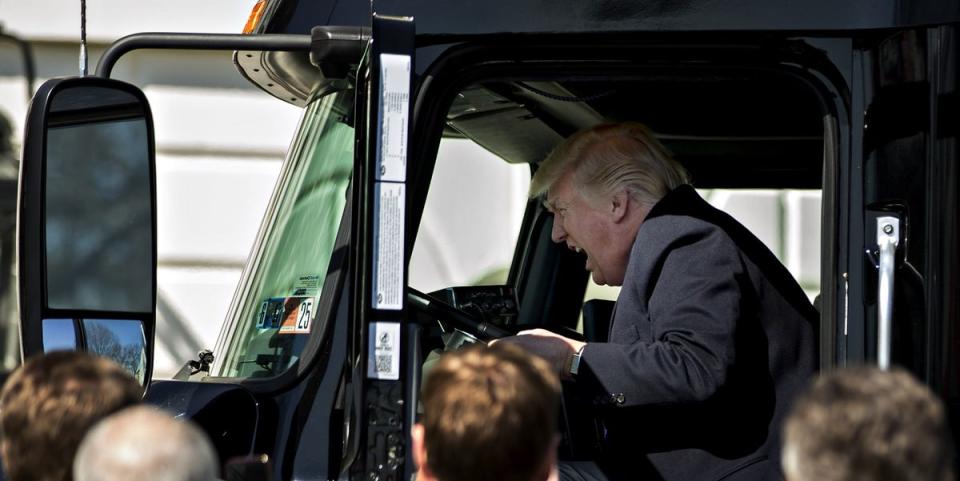Trump to enlist truckers to help sell his tax plan
President Donald Trump’s tax plan has been panned as a giveaway to the rich, so the White House is summoning some blue-collar advocates to rally for it: truck drivers.
Trump’s plan would slash business tax rates, lower individual rates and kill the estate tax for the richest families, among other things. That’s why the Tax Policy Center estimates the plan would cut taxes for the bottom 95% of earners by 1.2%, while the top 1% would get an 8.6% tax cut.
Not so, says Trump, who will insist in a speech in Harrisburg, Pa., on Wednesday evening that truckers and other middle-income workers stand to gain bigly from his plan.
“Truckers will be the No. 1 beneficiaries of President Trump’s tax plan,” a senior White House official told reporters on Oct. 10. “Nothing gets done in America without the hard-working men and women of the trucking industry.”
That may be true, but Trump’s trucker math is sure to warrant the same skepticism as the supply-side assumptions that underlie his whole tax plan. The typical trucker earns between $50,000 and $70,000 per year, Bob Costello, chief economist for the American Trucking Association, told Yahoo Finance earlier this year. A worker earning $70,000 and claiming no itemized deductions and three personal exemptions (for a spouse and child, say) would owe about $6,000 in federal taxes under the current system, falling into the 15% tax bracket. The Trump plan would eliminate personal exemptions while doubling the standard deduction, which would leave our simplified $70,000 earner with roughly the same tax bill, if tax brackets remained the same. If the $70,000 trucker fell into the new 12% bracket Trump has proposed, his tax bill would probably end up a bit lower, depending on other details of the ultimate plan.

Tax plan’s promise of a boom
Trump’s broader claim is that other elements of his tax plan would create trucker boom times the likes of which we’ve never seen. Cutting corporate taxes would, in theory, generate more demand for goods that would move by — can you guess? Right. Truck. Truckers who file their taxes as so-called pass-through entities would benefit from lower rates for those types of businesses (though only if they made way more than the typical driver). Then there are family-owned trucking companies that would be spared the hardship of having to sell parts of their fleet to pay the dastardly estate tax when a principal owner dies. How many trucking families are worth more than $5.49 million — the value at which the federal estate tax kicks in — the White House doesn’t seem to know.
Kevin Hassett, chairman of the White House’s Council of Economic Advisers, gave a speech recently touting the many ways tax cuts can stimulate economic activity. He claimed tax reform along the lines of what Trump proposes could boost the typical family’s take-home pay by $4,000 a year. Expect this to become a Trump talking point.
Hassett is a well-regarded tax expert, but there is plenty of countervailing evidence that tax cuts alone don’t do much to boost economic growth in ways that thoroughly benefit the middle and working class. A 2016 analysis by economists William Gale and Andrew Samwich found that tax reform that makes the system fairer and more efficient can modestly boost growth. But tax cuts that aren’t offset by spending cuts, and thus add to the national debt, can push interest rates up and pinch growth. There have also been times when tax hikes, rather than cuts, have corresponded with economic growth. Much depends on the health of the overall economy and who benefits the most. If it really were truckers, we’d all probably end up better off.
Confidential tip line: [email protected]. Encrypted communication available.
Rick Newman is the author of four books, including Rebounders: How Winners Pivot from Setback to Success. Follow him on Twitter: @rickjnewman
